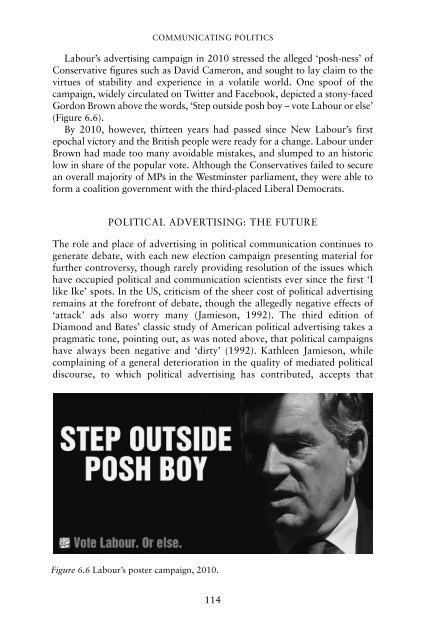20130412164339753295_book_an-introduction-to-political-communication
20130412164339753295_book_an-introduction-to-political-communication
20130412164339753295_book_an-introduction-to-political-communication
Create successful ePaper yourself
Turn your PDF publications into a flip-book with our unique Google optimized e-Paper software.
COMMUNICATING POLITICS<br />
Labour’s advertising campaign in 2010 stressed the alleged ‘posh-ness’ of<br />
Conservative figures such as David Cameron, <strong>an</strong>d sought <strong>to</strong> lay claim <strong>to</strong> the<br />
virtues of stability <strong>an</strong>d experience in a volatile world. One spoof of the<br />
campaign, widely circulated on Twitter <strong>an</strong>d Face<strong>book</strong>, depicted a s<strong>to</strong>ny-faced<br />
Gordon Brown above the words, ‘Step outside posh boy – vote Labour or else’<br />
(Figure 6.6).<br />
By 2010, however, thirteen years had passed since New Labour’s first<br />
epochal vic<strong>to</strong>ry <strong>an</strong>d the British people were ready for a ch<strong>an</strong>ge. Labour under<br />
Brown had made <strong>to</strong>o m<strong>an</strong>y avoidable mistakes, <strong>an</strong>d slumped <strong>to</strong> <strong>an</strong> his<strong>to</strong>ric<br />
low in share of the popular vote. Although the Conservatives failed <strong>to</strong> secure<br />
<strong>an</strong> overall majority of MPs in the Westminster parliament, they were able <strong>to</strong><br />
form a coalition government with the third-placed Liberal Democrats.<br />
POLITICAL ADVERTISING: THE FUTURE<br />
The role <strong>an</strong>d place of advertising in <strong>political</strong> <strong>communication</strong> continues <strong>to</strong><br />
generate debate, with each new election campaign presenting material for<br />
further controversy, though rarely providing resolution of the issues which<br />
have occupied <strong>political</strong> <strong>an</strong>d <strong>communication</strong> scientists ever since the first ‘I<br />
like Ike’ spots. In the US, criticism of the sheer cost of <strong>political</strong> advertising<br />
remains at the forefront of debate, though the allegedly negative effects of<br />
‘attack’ ads also worry m<strong>an</strong>y (Jamieson, 1992). The third edition of<br />
Diamond <strong>an</strong>d Bates’ classic study of Americ<strong>an</strong> <strong>political</strong> advertising takes a<br />
pragmatic <strong>to</strong>ne, pointing out, as was noted above, that <strong>political</strong> campaigns<br />
have always been negative <strong>an</strong>d ‘dirty’ (1992). Kathleen Jamieson, while<br />
complaining of a general deterioration in the quality of mediated <strong>political</strong><br />
discourse, <strong>to</strong> which <strong>political</strong> advertising has contributed, accepts that<br />
Figure 6.6 Labour’s poster campaign, 2010.<br />
114
















